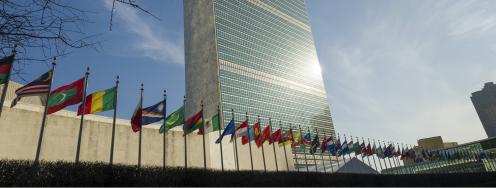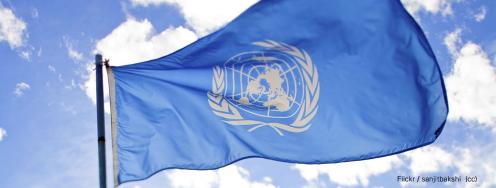Iran Talks Head Into Overtime
On the radar: Given progress, negotiators look to slow clock; Experts overwhelmingly support Iran talks; Nuclear sleuths go high tech; Placing Khamenei’s rhetoric in context; Analysing likely scenarios for sanctions relief; and Looking beyond Iran, why does anyone still have nukes?
The day the earth stood still - “Negotiators from Iran and six world powers may ‘stop the clock’ for a day or two if they run up against a self-imposed July 7 deadline to conclude a final Iran nuclear deal,” writes Laura Rozen for Al-Monitor. “Diplomats said they had made significant progress here on the text and annexes of the accord, even while they still had important differences to overcome.”
--“Negotiators made clear they hope to conclude the accord the next few days in Vienna versus going home and coming back again, at the risk of losing momentum and having to renegotiate issues they thought were already solved.” Diplomats have also acknowledged it is preferable to “finish the deal if at all possible by July 9, which is now considered the drop-dead date” for negotiations.
--This date is significant because it is the de facto deadline for the U.S. administration to submit the deal to Congress before July 10, “after which Congress would get 60 days versus 30 days to review it.” Read the full story here.http://bit.ly/1J2jaZm
Tweet - @marieharf: More concerned about quality of deal than about the clock; also know difficult decisions won't get any easier w/time: why cont to negotiate
Expert consensus - “There is an overwhelming consensus among non-proliferation, nuclear policy, and national security experts that a negotiated accord is the best, and likely the only, way to ensure that Iran never builds a nuclear weapon,” writes Joe Cirincione for LobeLog. “But you would not know that if you relied on congressional hearings or most media coverage of the negotiations.”
--“No sooner had the ink dried on the April framework agreement to freeze and roll back Iran’s nuclear program than critics began decrying its supposed shortcomings… As we have gotten closer to a final agreement, the torrent of criticism has grown, but very little of it comes from actual nuclear policy experts. In truth, the expert opinion is decisively in favor of the negotiating effort.” Full piece here. http://bit.ly/1RfZyut
High tech nuke sleuths - One of the main reasons a nuclear deal with Iran might just work is the highly sophisticated “ring of surveillance surrounding the Tehran regime.” Sceptics frequently argue that the President can make all the deals he wants, “Iran will still cheat and keep working toward a bomb… But cheating is harder than it seems, due to the development of new surveillance and nuclear verification technologies.”
--“The International Atomic Energy Agency can field a sophisticated array of gadgetry to detect if Iran is departing from its obligations: fiber-optic seals on equipment that can signal the IAEA if they are cut; infrared satellite imagery that can track down hidden reactors; environmental sensors that can detect minute signs of nuclear particles; hardened cameras built to withstand tampering and radiation.
--Western intelligence services can add even more to that list: “Sophisticated cyber espionage operations; an array of seismic and acoustic sensors; and networks of old-fashioned, human spies.” Tim Mac has the full story for The Daily Beast. http://thebea.st/1J2iVxE
Do as I do, not as I say - “Despite his image as a hard-liner—and his occasional fulminations against Western perfidy—it is Khamenei who has been the guardian angel for Iran’s nuclear negotiators for the past 18 months,” writes Omid Memarian for Politico. “If the negotiations end in a final agreement by July 7… it will be Khamenei who makes the deal. Or breaks it. Thus, as we head into the final stages, it’s important for the West to see beyond the supposed ‘red lines’ that Khamenei has laid out in his remarks to understand the tricky domestic politics his comments are meant to navigate."
--“He has consistently reopened the door to a continuation of the negotiations [in which his general statements] indicated his support for reaching an agreement with Western countries, even at the cost of some setbacks. And for those who are sitting at the negotiation table, this matters the most.” Read the full article here.
--See also: “Any Iran nuclear deal should be judged on its contents, not the rhetoric,” by Walter Pincus in The Washington Post. http://wapo.st/1JRDLCE
Domestic priorities - “As negotiators close in on a nuclear deal with Iran, there’s been a corresponding uptick in ominous expectations about how Tehran could use the potential rush of funds from sanctions relief to prey on its weak neighbors and secure regional hegemony… These fears are wildly overblown,” writes Richard Nephew in Foreign Policy.
--“Iran’s domestic economic needs are real, as is Iranian President Hassan Rouhani’s imperative to deliver on the promises that got him elected and proceed with the talks. To ensure the stability of their government, Iran’s leaders must tend to the problems at home and make the investments necessary to sustain their future… Far from being a giveaway to a terrorism-supporting regime… sanctions relief may be the key to creating an Iran with a real stake in the international order.” Full story in here. http://atfp.co/1IUfc5c
Quick Hit:
--“Netanyahu prepares to fight world over Iran deal,” in Haaretz http://bit.ly/1dJXV5W
Events:
--“House Foreign Affairs Subcommittees on Asia and the Pacific and Terrorism, Nonproliferation, and Trade, hearing on ‘Reviewing the U.S.-China Civil Nuclear Cooperation Agreement,’” featuring Thomas Countryman, Frank Klotz, Henry Sokolski, David Lipman and Sharon Squassoni. Wednesday, July 8 from 2:00 - 5:00 PM. Located at the Center for Strategic and International Studies, 2172 Rayburn House Office Building, Washington, D.C. Webcast available here. http://1.usa.gov/1RioUrT
--“The Future of the U.S.-India Partnership: Ten Years After the Civil Nuclear Cooperation Initiative,” featuring William J. Burns, Chandrajit Banerjee, Arun Singh, Nisha Biswal, R. Nicholas Burns, David Sanger, Stephen Hadley and more. Monday, July 13 from 8:15 AM - 5:00 PM. Located the Carnegie Endowment for International Peace, 1779 Massachusetts Ave., Washington, DC. RSVP here. http://ceip.org/1JRGPi6
--“Can We Save the Nonproliferation Regime?,” featuring Des Browne, Nuclear Threat Initiative and six additional panelists. Tuesday, July 14 from 10:30 AM - 2:00 PM. Located at the Johnson Center, Fifth Floor, 1399 New York Ave., Washington, D.C. RSVP here. http://bit.ly/1HaOiVu
--“State Department, ‘Generation Prague Conference’”. Wednesday- Friday, July 15 - 17. Located at the State Department, George C. Marshall Auditorium, 21st St., NW, between C St. & Virginia Ave., Washington, DC and George Washington University Elliott School of International Affairs, 1957 E St., NW, Washington, DC. RSVP here. http://bit.ly/1Swamlo
Dessert:
Why does ANYONE still have nukes? - In the context of the Iran nuclear negotiations Newsy has published a video that begs the question, why does anyone still have nuclear weapons? http://bit.ly/1NOHz99



